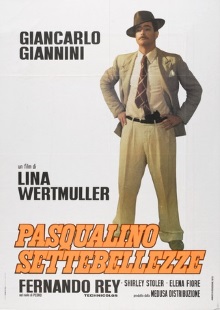
Seven Beauties is one of two films that my wife asked to add to our list by Italian director Lina Wertmüller. It is apparently quite a prominent film and represented the first time that a female director was nominated for the Best Director Award at the Oscars even though it didn’t go on to win. Unfortunately both my wife and myself had so much trouble relating to it that it’s hard to say we like it, though we do acknowledge that it’s a unique and highly distinctive film.
Set during the Second World War, this tells the story of Naples man Pasqualino, nicknamed Settebellezze or Seven Beauties as a reference to his seven sisters. When you see for yourself that his sisters all rather portly and unattractive women, you start to understand the kind of morbid humor found in this film. A small-time crook who sees himself as something of a Casanova, he learns that one his sisters has been prostituting herself and murders the pimp. After being arrested and sent to prison, he becomes embroiled in a series of adventures that ultimately ends up with him being held in a German concentration camp.
It seems like a plot that is conventional enough but it’s hard to digest it because Pasqualino, for all of his surface charm and the terrible circumstances he finds himself in that should engender some sympathy, is a thoroughly despicable character. In one scene that is especially painful to watch, he actually rapes a fully restrained female patient in an institution for the mentally ill because, he apologetically says, it has been too long since he has had a woman. He’s the hero of the film in the sense that he gets into all sorts of trouble and you watch him get out of it, but because he’s not someone you can actually root for, you’re left wondering what the film is trying to say and what it is really about.
Clues can be gathered from the lengthy diatribe that the film opens with. Directed apparently against a specific type of the Italian bourgeois class, it bemoans everything from the blindly patriotic to those who are apathetic about politics. It’s hard to know what to make of it both because the attacks are so broad and because it’s delivered in a self-deprecating tone with each line ending with a casual “Oh yeah”. Generally speaking, critics seem to believe that this film is about surviving no matter what happens, and the costs of doing so. That’s certainly a valid interpretation but I think that doesn’t quite tell the whole story.
After thinking about this for a while, my own conclusion is that this is the Italian analogue of Lu Xun’s The True Story of Ah Q. It’s a portrait of a man who embodies the worst stereotypical traits of Italians, particularly for that period. He claims to be a proud Italian and sings the praises of Mussolini, yet when questioned he turns out to know little of politics. It is telling that the political dissident that he meets and who later dies is a Spanish anarchist and not an Italian at all. With his loud machismo, he boasts about stealing the hearts of women, yet in the end he literally submits in every way to a woman in order to survive. In more general sense, he also represents the Italian state which signed up to fight alongside Hitler’s soldiers, yet is so ineffective and cowardly that even their own allies despise them. Yet, as even the German camp commandant admits, at the end it is the cockroaches like him who survive.
This is a startlingly vicious message, probably possible only because Wertmüller herself is Italian. It’s also a very good reason for a film to have as sterling a reputation as this one does. Unfortunately it does presuppose a kind of intimate familiarity with that stereotype that probably only Europeans really possess. Since this is a case of an Italian critiquing Italians and their culture themselves, even passing judgment on the film as an outsider with little sense of how true it is feels somewhat uncomfortable. That’s why while I can see the artistic merit in it, I can’t say that this film works for me at all.
One thought on “Seven Beauties (1975)”